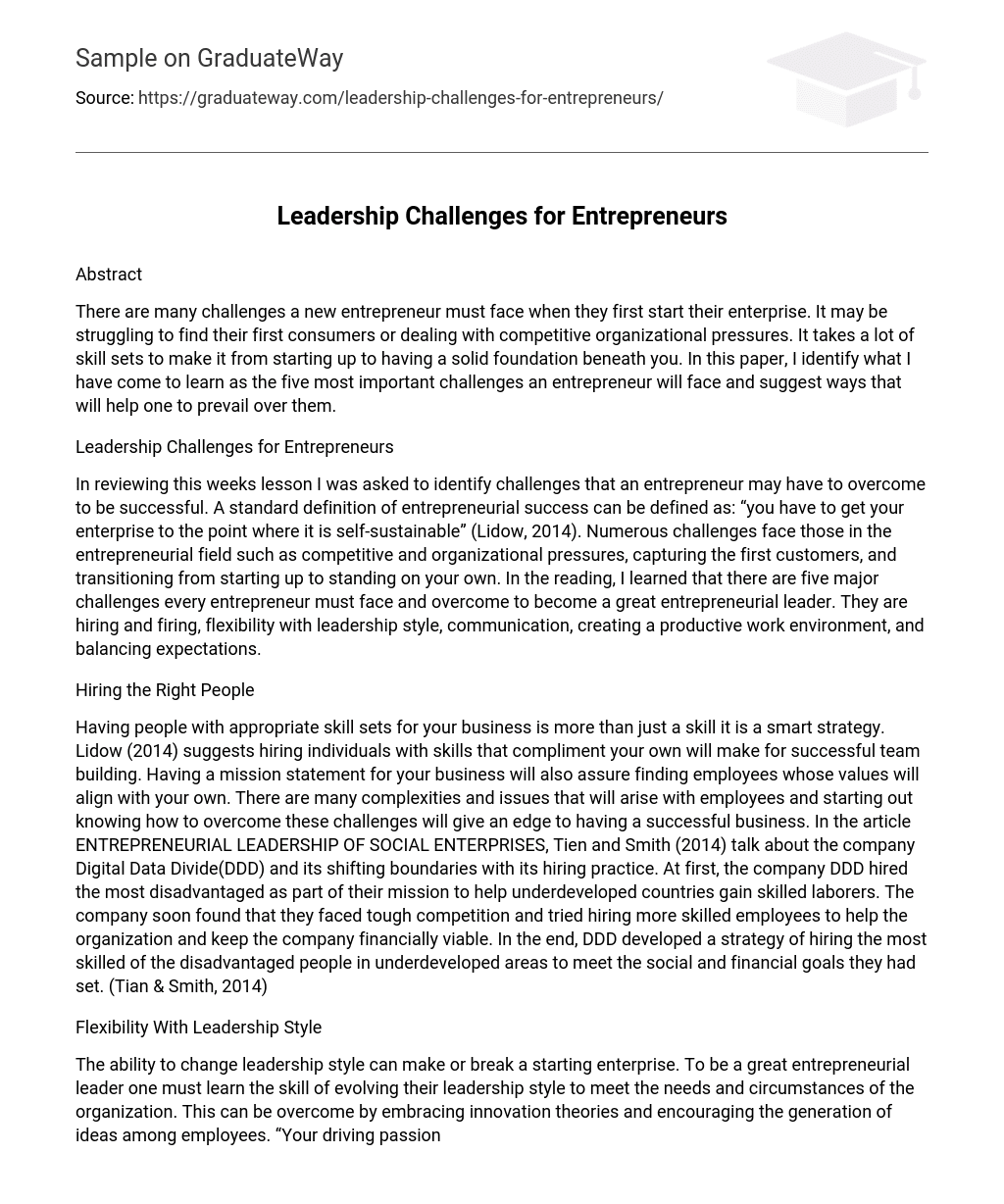Abstract
There are many challenges a new entrepreneur must face when they first start their enterprise. It may be struggling to find their first consumers or dealing with competitive organizational pressures. It takes a lot of skill sets to make it from starting up to having a solid foundation beneath you. In this paper, I identify what I have come to learn as the five most important challenges an entrepreneur will face and suggest ways that will help one to prevail over them.
Leadership Challenges for Entrepreneurs
In reviewing this weeks lesson I was asked to identify challenges that an entrepreneur may have to overcome to be successful. A standard definition of entrepreneurial success can be defined as: “you have to get your enterprise to the point where it is self-sustainable” (Lidow, 2014). Numerous challenges face those in the entrepreneurial field such as competitive and organizational pressures, capturing the first customers, and transitioning from starting up to standing on your own. In the reading, I learned that there are five major challenges every entrepreneur must face and overcome to become a great entrepreneurial leader. They are hiring and firing, flexibility with leadership style, communication, creating a productive work environment, and balancing expectations.
Hiring the Right People
Having people with appropriate skill sets for your business is more than just a skill it is a smart strategy. Lidow (2014) suggests hiring individuals with skills that compliment your own will make for successful team building. Having a mission statement for your business will also assure finding employees whose values will align with your own. There are many complexities and issues that will arise with employees and starting out knowing how to overcome these challenges will give an edge to having a successful business. In the article ENTREPRENEURIAL LEADERSHIP OF SOCIAL ENTERPRISES, Tien and Smith (2014) talk about the company Digital Data Divide(DDD) and its shifting boundaries with its hiring practice. At first, the company DDD hired the most disadvantaged as part of their mission to help underdeveloped countries gain skilled laborers. The company soon found that they faced tough competition and tried hiring more skilled employees to help the organization and keep the company financially viable. In the end, DDD developed a strategy of hiring the most skilled of the disadvantaged people in underdeveloped areas to meet the social and financial goals they had set. (Tian & Smith, 2014)
Flexibility With Leadership Style
The ability to change leadership style can make or break a starting enterprise. To be a great entrepreneurial leader one must learn the skill of evolving their leadership style to meet the needs and circumstances of the organization. This can be overcome by embracing innovation theories and encouraging the generation of ideas among employees. “Your driving passion will be your source of energy to make changes, to develop critical skills, and to endure the hardships and discomforts required of every entrepreneurial leader” (Lidow, 2014).
Communication
Effective communication may be the most pivotal challenge to overcome in my opinion. Communication is a recurring theme in many of the other challenges. You must be able to communicate effectively with your employees. Your mission statement must effectively communicate with your consumers. Your objectives should be clear and precise. Ways you can improve communication are practice good listening skills, master non-verbal communication, and learn to use technology successfully.
Create A Productive Work Environment
What kind of culture you create for your business follows in line with having effective communication. Remaining aware of your employees’ happiness in their work environment needs to be balanced with developing and demonstrating a clear idea of the organizational structure and hierarchy. “It does great damage to an enterprise and its culture when an entrepreneur selfishly implements an organizational structure that impedes her team’s ability to implement the strategy or operate productively” (Lidow, 2014)
Balancing Expectations
The greatest of all the challenges I learned of facing entrepreneurs is learning to balance expectations to reality standards. No one person can do all things on their own. An entrepreneur must be clear about what they can deliver, the time it will take, and have promising results. To overcome this challenge I believe an entrepreneur should continually strive to be a better leader through practice and study. Taking courses or reading books on subjects such as self-awareness, enterprise basics, and relationship building would help create a strong skill set for a great entrepreneurial leader.
References
- Lidow, D. (2014). Startup Leadership : How Savvy Entrepreneurs Turn Their Ideas Into Successful Enterprises (Vol. First edition). San Francisco: Jossey-Bass. Retrieved from http://ezproxy.apus.edu.ezproxy2.apus.edu/login?url=http:// search.ebscohost.com/login.aspx? direct=true&AuthType=ip&db=nlebk&AN=705922&site=ehost-live&scope=site
- Tian, Y., & Smith, W. (2014). Entrepreneurial Leadership of Social Enterprises: Challenges and Skills for Embracing Paradoxes. Journal of Leadership Studies, 8(3), 42–45. https://doi.org/10.1002/jls.21339





